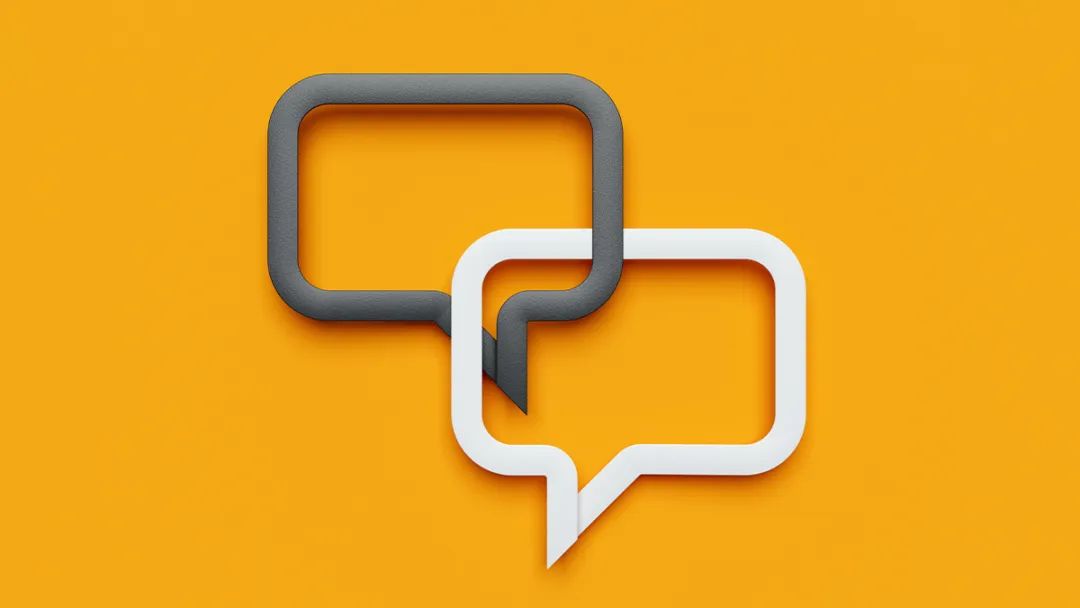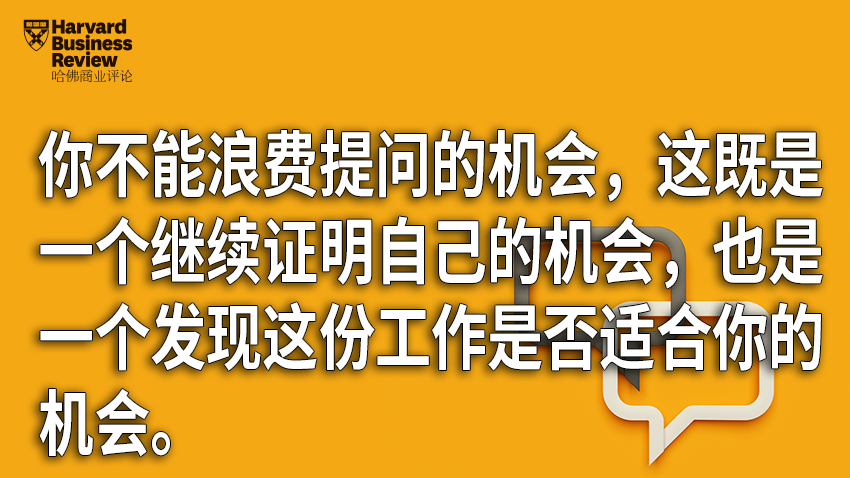38 Smart Questions to Ask in a Job Interview

“你有什么问题要问我吗?”
在求职面试中,当走到这一步时,意味着面试官已经问完了他们的问题,开始将提问的机会开放给你。你肯定不想被问个措手不及,所以,计划好你的回应,并抓住这个机会提出一系列问题,这一点很重要。那么你应该提什么样的问题呢?你需要避免哪些方面呢?
“So, do you have any questions for me?”
When you reach this point in a job interview — where the interviewer is done with their questions and opens up the floor — you don’t want to be caught off guard. It’s important to have a plan for how you’ll respond, and a list of questions specific to that opportunity. But what types of questions should you actually ask? And are there certain ones to avoid?
我向两位工作面试专家寻求建议:德克萨斯大学奥斯汀分校的教授、《让你的大脑投入工作》(Bring Your Brain to Work)一书的作者阿特•马克曼,以及英国职业策略师、《如何找到你喜欢的工作》(How to Get a job You Love)一书的作者约翰•李斯。以下是他们关于如何处理面试结尾提问的建议,以及他们在实践中看到的一些示例问题。
I turned to two job interview experts for advice: Art Markman, a professor at the University of Texas at Austin and author of Bring Your Brain to Work, and John Lees, a UK-based career strategist and author of How to Get a Job You Love. Here are their recommendations for how to approach this part of the interview and sample questions they’ve seen work in practice.
专注于两个目标
Focus on two goals.
你可能会把面试的这一部分流程看作是你评估这个组织,以及评估自己是否真的想在这里工作的机会。事实的确如此。马克曼认为,你的目标之一就是利用这些问题来帮助你确定这个机会是否真的适合你。
You might think of this portion of the interview as your chance to assess the organization and whether you really want to work there, and that’s true. One of your goals is to use these questions to help you determine if this opportunity is right for you, says Markman.
然而,面试还没有结束,你仍然需要继续证明自己是这份工作的最佳人选,李斯说。所以,你的另一个目标是继续证明你适合这份工作。李斯建议我们可以这样说:“我确实有几个问题,但在我提问之前,我能说一件事吗?”这样说可以给你一个机会来传达一些关键信息,表明你的确能够胜任这份工作。事实上,在面试之前,你应该“提前决定你想要传达的两到三点信息,”李斯说,如果到提问环节,你还没有在面试官先前所提的问题中传达这些信息,你现在就应该这么做。然后,你就可以开始提问了。
However, the interview isn’t over yet, and you still want to demonstrate that you are the best person for the job, says Lees. So, your other goal is to continue to prove you’re a fit for the specific opportunity. Lees suggests saying something like, “I do have a few questions but before I ask, can I say one thing?” That will give you an opportunity to drive home any key messages about your suitability for the job. In fact, before the interview, you should “decide in advance on two or three messages that you want to get across,” says Lees, and if you haven’t been able to convey those points in response to the questions you’ve been asked so far, you should do so now. Then, you can move on to your questions.
提出个性化问题
Personalize your questions.
如何表达你的问题,这点很重要。不要使用泛泛的语言,你要问的问题应该是专门与自己有关的。例如,不要问“(这份工作的)一天通常是怎么样度过的?”,你应该问:“我在这份工作上的一天会是怎样的?”这样可以让招聘经理看到你是否适合这个职位。根据李斯的说法,这是一种“心理技巧”,因为“一旦他们想象出你在做这份工作,就很难忘记这个画面。”
How you phrase your questions is important. Rather than using generic language, you want to ask the questions as if they pertain specifically to you. For example, instead of “What does a typical day look like?” you want to ask “What would a typical day for me in this role look like?” That will allow the hiring manager to begin seeing you in the role. According to Lees, this is a “great psychological trick” because “as soon as they visualize you doing the job, it’s hard to let go of that image.”
你的问题应该以你们的谈话为基础
Build off of your conversation.
你肯定想要了解目前为止在面试中过程发生了什么事情。你可以问一些之前和面试官已经讨论过的问题。进一步阐释之前的面试环节提到的、自己正在从事的项目,也可以补充在先前的工作描述中没有提到的职责。关键是要让这部分的面试感觉像是先前对话的延续。
You also want to pick up on what’s happened in the interview so far. Ask questions that build off of what you and the interviewer have discussed. You might want to follow up on a project they mentioned you’d be working on, or a responsibility that you didn’t see in the job description. The key is to make this portion of the interview feel like a continuation of the conversation.
面试结束时的问题范例
Sample Questions to Ask at the End of a Job Interview
以下是几类你可能需要考虑的问题,每个类别之下都有一些个性化的问题样本:
Here are categories of questions you’ll want to consider in an organized list, along with samples of each that you can personalize.
◆ 关于具体工作的问题
◆ Questions about the specific job
1.你对我这个职位有什么期望吗?
2.在最初的90天里,我应该完成的最重要的事情是什么?
3.我们的绩效评估流程是怎样的?我过多久会被正式评估一次?
4.我的绩效将根据什么指标或目标进行评估?
5.我最迫切需要承担的项目是什么?
6.要过多久我才能……(会见客户,负责自己的账户,与其他部门互动,等等)?
1.What are your expectations for me in this role?
2.What’s the most important thing I should accomplish in the first 90 days?
3.What’s the performance review process like here? How often would I be formally reviewed?
4.What metrics or goals will my performance be evaluated against?
5.What are the most immediate projects that I would take on?
6.How long before I will be… [meeting with clients, have responsibility for my own accounts, interacting with other departments, etc.]?
◆ 关于团队的问题
◆ Questions about the team
7.你希望新员工能够填补团队缺少的哪些技能?
8.我在这个职位上可能面临的最大挑战是什么?
9.你认为我在这个职位上的主要职责,会在未来六个月到一年内改变吗?
10.你能告诉我将要和我一起工作的团队情况吗?
11.我和谁的合作最密切?我需要与哪些部门或单位进行互动?
12.你能给我讲讲我的直接下属吗?他们的优势和团队面临的最大挑战是什么?
7.What types of skills is the team missing that you’re looking to fill with a new hire?
8.What are the biggest challenges that I might face in this position?
9.Do you expect my main responsibilities in this position to change in the next six months to a year?
10.Can you tell me about the team I’ll be working with?
11.Who will I work with most closely? What other departments or units will I interact with?
12.Can you tell me about my direct reports? What are their strengths and the team’s biggest challenges?
◆ 关于你未来老板的问题
如果面试官是你的老板,你也可以问这些问题。
◆ Questions for your potential boss
If the interviewer is your boss, you want to ask questions along these lines as well.
13.您在这家公司工作多久了?
14.您当经理多久了?
15.在这里工作,您最喜欢的内容是什么?
13.How long have you been at the company?
14.How long have you been a manager?
15.What’s your favorite part of working here?
◆ 关于公司的问题
这里有一个重要的注意事项:不要问那些你可以通过谷歌快速搜索很容易就能搜到的问题(更多关于这方面的问题,请参阅“需要避免的问题”部分)。
◆ Questions about the company
One important note here: Don’t ask things that you can easily find with a quick Google search (more on this in the “Questions to Avoid” section).
16.公司目前关注的目标是什么?这个团队如何努力来支持这些目标的实现?
17.公司未来最让你兴奋的点是什么?
18.你如何描述公司的价值观?
19.在过去的几年中,公司发生了怎样的变化?
20.公司的增长和发展计划是什么?
16.What are the current goals that the company is focused on, and how does this team work to support hitting those goals?
17.What gets you most excited about the company’s future?
18.How would you describe the company’s values?
19.How has the company changed over the last few years?
20.What are the company’s plans for growth and development?
◆ 关于公司文化的问题
李斯警告说,在有关公司文化的问题上,你应该持保留态度。面试官不太可能站出来,告诉你说这里的文化不受欢迎,甚至是有害的。这就是为什么像下面的第22个问题这类的问题会很有帮助。你不需要明确询问,就能了解公司文化,并且可以“帮助你发现隐藏于新工作场所中的任何意想不到的因素。”马克曼说。
◆ Questions about the culture
Lees warns that you should take answers to questions about the company culture with a grain of salt. It’s highly unlikely that the interviewer is going to come out and tell you that the culture is unwelcoming, or even toxic. That’s why questions like #22 below can be helpful. They get at company culture without explicitly asking about it and can “help you uncover any unexpected elements about your potential new workplace,” Markman says.
21.你们通常是如何培养员工的?
(马克曼建议道,如果这个职位需要远程办公,可以具体询问远程办公的员工如何融入公司文化。)
22.新员工在开始工作后通常会发现什么令人惊讶的事情?
23.在开始工作之前,我应该读些什么材料来帮助我和同事们达成共识?
(问这个问题不仅表明你对这个职位感兴趣,也表明你渴望“与你将要共事的人分享文化背景,”马克曼说。)
24.你最喜欢的办公室传统是什么?
25.你和团队在午餐时通常做些什么?
26.你曾经和其他部门或团队合作过吗?
27.在这里工作和你以前工作过的其他地方有什么不同?
28.自从你加入公司以来,公司发生了什么变化?
21.How do you typically onboard employees?
- If the position will be remote, ask specifically about how remote employees are integrated into the company culture, Markman advises.
22.What do new employees typically find surprising after they start?
23.Is there anything that I should read before starting that would help me have a shared understanding with my colleagues?
- Asking this question not only signals your interest in the position but also shows that you’re eager to have “shared cultural references with the people you’ll be working with,” Markman says.
24.What’s your favorite office tradition?
25.What do you and the team usually do for lunch?
26.Do you ever do joint events with other departments or teams?
27.What’s different about working here than anywhere else you’ve worked?
28.How has the company changed since you joined?
◆ 关于专业发展、职业道路和未来机会的问题
马克曼说,了解工作中的成长和职业发展机会是至关重要的。你要确保自己不仅能在目前的工作岗位上有所建树,还能看到公司里有一条让你感到兴奋的职业发展道路。
◆ Questions about professional development, career paths, and future opportunities
Markman says it’s critical to understand what growth and career development will look like in the job. You want to be sure that you can see yourself not just in the role you’re currently applying for but that there is a career path at the organization that you’re excited about.
29.在这个职位上我有什么学习和进一步发展的机会?
30.我所在的团队如何持续在专业上成长?
31.有没有从这个职位开始的职业生涯(成功的)案例?
32.本部门常见的职业发展道路是什么?
33.我们通常是如何晋升的?
34.成功的员工都去了哪里?
29.What learning and development opportunities will I have in this role?
30.How does the team I’ll be part of continue to grow professionally?
31.Are there examples of a career path beginning with this position?
32.What are the common career paths in this department?
33.How are promotions typically handled?
34.Where have successful employees moved on to?
◆ 结束性问题
Closing questions
35.我还有什么应该提问但尚未提问的问题吗?
36.我还能提供什么有用的东西吗?
37.关于我的资质问题,还有什么需要我进一步澄清的吗?
38.招聘流程的下一步是什么?
35.What am I not asking you that I should?
36.Is there anything else I can provide you with that would be helpful?
37.Is there anything I clarify for you about my qualifications?
38.What are the next steps in the hiring process?
◆ 需要避免的问题
以下是一些面试结束时不该问的问题:
Questions to Avoid
Here are a few examples of what not to ask at the end of your interview:
· 起薪是多少?
· 你能告诉我你的健康保险情况吗?
· 你们的带薪休假政策是什么?
· What’s the starting salary?
· Can you tell me about your health insurance?
· What are your paid leave policies?
李斯建议说,不要在面试过程中过早地询问薪资和福利待遇的问题。“(此时)你无法有效地谈判,因为你仍处于未知领域。在他们钟情于你之后,才是讨论薪水的时候,”他解释道。但是如果面试官问你对薪水的要求呢?你可以利用一些有用的技巧,来解决这个复杂的问题。
You want to avoid asking about salary and benefits too early in the process, Lees advises. “You’re not in a position to negotiate well because you’re still in unknown territory. The time to discuss salary is after they’ve fallen in love with you,” he explains. But what if the interviewer asks you about your salary requirements? This video offers helpful tips for how to navigate that complicated question:
你也应该避免问那些看起来像是要达成交易的问题。(“那么,我得到这份工作了吗?”)因为这样让人听起来很冒昧,或者让人觉得你不尊重公司的面试流程。
You should also avoid asking questions that try to close the deal. (“So, do I have the job?”) You don’t want to sound presumptuous or like you don’t respect the company’s interview process.
此外,不要问一些你在之前的调查中就已经知道的问题——你绝对应该提前对这份工作和这家公司进行调查。
Also refrain from asking something that you could’ve found out in your research ahead of time — and you should definitely do research about the job and the company ahead of time!

你不能浪费这个提问的机会。这既是一个继续证明自己的机会,也是一个发现这份工作是否适合你的机会。
This opportunity to ask questions is one you don’t want to waste. It’s both a chance to continue to prove yourself and to find out whether this job is the right fit for you.
当然,你不可能问完上述38个问题。你可以提前选择那些与你、你的兴趣和具体工作更相关的问题。然后把它们写下来——要么写在纸上,要么写在手机上——然后提前看一眼,这样它们就会在你的脑海中清晰地浮现出来。当然,也要注意面试官的时间。如果你被安排了一个小时的面试,而他们只剩下五分钟时间关注你的问题,那你可以选择两到三个对你来说最重要的内容。一旦你拿到了这份工作机会,你总是会有更多的时机来提出问题。
Of course, you aren’t going to ask all 38 of these questions. Choose the ones that are more relevant to you, your interests, and the specific job ahead of time. Then write them down — either on a piece of paper or on your phone — and glance at them ahead of time so that they’re fresh in your mind. And, of course, be mindful of the interviewer’s time. If you were scheduled to talk for an hour and they turn to you with five minutes left, choose two or three questions that are most important to you. You will always have more time to ask questions once you have the job offer in hand.
关键词:求职
艾米·加洛是《哈佛商业评论》的特约编辑,也是“职场女性”播客的联合主持人之一,她著有两本书:《相处:如何与任何人共事》和《哈佛商业评论处理冲突指南》。
张振涛|译 周强|编校




